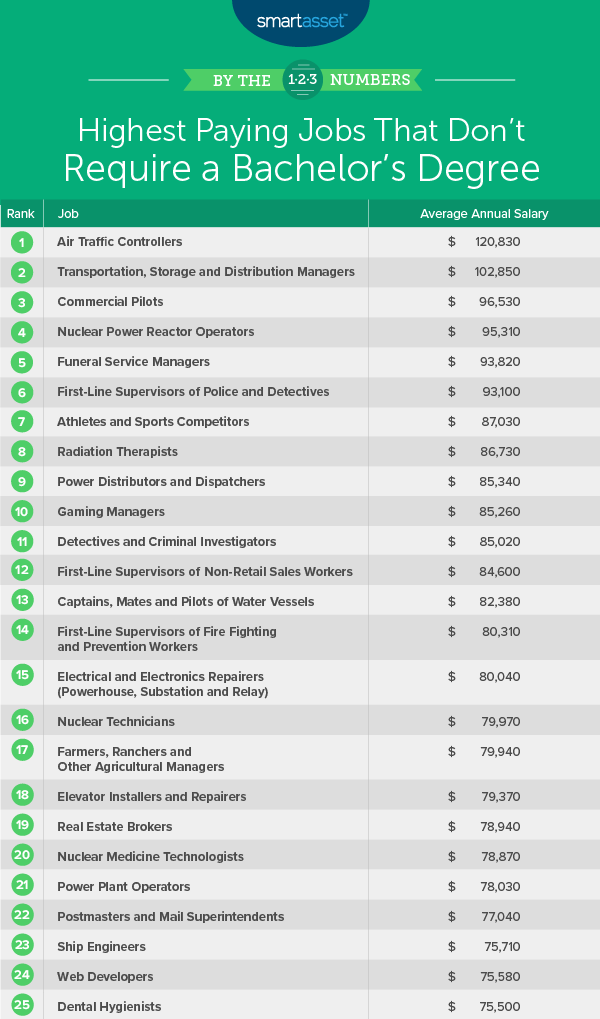
About two-thirds of the jobs outlined by the Bureau of Labor Statistics (BLS) in 2018 do not require workers to have a bachelor’s or advanced degree. Though pay is generally correlated with education level and the majority of those jobs have average annual salaries below $50,000, some jobs that require only an associate’s degree or less actually pay pretty well. As a result, they can allow workers to meet their savings goals more quickly.
In this study, we looked at the highest-paying jobs that don’t require a bachelor’s or advanced degree. Using BLS data from 2018, we sorted occupations by the typical degree needed for entry and then ranked occupations requiring an associate’s degree or less by the average annual salary for workers in that occupation. For details on our data sources and how we put the information together to create our rankings, check out our Data and Methodology section below.
Key Findings
- Practical training is often still required. Many of the highest-paying jobs that don’t require a bachelor’s or advanced degree still require significant training, much of which is hands-on. For instance, commercial pilots, ranking third in our study, must have a commercial pilot’s license from the Federal Aviation Administration. Radiation therapists, ranking eighth, must complete a program in radiation therapy that varies by state.
- Aviation and law enforcement make big appearances. Our first- and third-highest-paying jobs are air traffic controllers and commercial pilots. In 2018, the average annual salaries for the two occupations were $120,830 and $96,530, respectively. In terms of law enforcement occupations, first-line supervisors of police and detectives ranks sixth and detective and criminal investigators ranks 11th, with average annual salaries of $93,100 and $85,020, respectively.

1. Air Traffic Controllers
The average annual salary for air traffic controllers in the U.S. was $120,820 in 2018, the highest of any job that does not require a bachelor’s or advanced degree. In terms of hourly salary, air traffic controllers make about $58 on average, according to BLS estimates.
Though air traffic controllers do not typically need a bachelor’s degree for entry, an associate’s degree is required for most applicants. BLS reports that most candidates must have an associate’s degree from the Air Traffic Collegiate Training Initiative program.
2. Transportation, Storage and Distribution Managers
In 2018, the average annual salary for transportation, storage and distribution managers was $102,850, about 15% less than that of air traffic controllers, but still six figures. There are more opportunities for workers to become transportation, storage and distribution managers than there are for people looking to become air traffic controllers. In 2018, there were 124,810 transportation, storage and distribution managers in the U.S., but only 22,390 air traffic controllers nationwide.
3. Commercial Pilots
The average annual salary for commercial pilots is lower than that of air traffic controllers, potentially a product of the typical level of education needed for entry. In 2018, commercial pilots made just below $97,000 on average and, unlike for air traffic controllers, an associate’s degree is not generally required. BLS reports that commercial pilots need a high school diploma or equivalent and a commercial pilot’s license from the Federal Aviation Administration. This is one of the riskiest occupations in America.
4. Nuclear Power Reactor Operators
In 2018, the average annual salary for nuclear power reactor operators was $95,310 or about $45 per hour. Nuclear power reactor operators control the systems that generate and then distribute electric power. Notably, nuclear power reactor operators have had negative job growth in the past five years. In 2014, there were 7,400 nuclear power reactor operators in the U.S., and in 2018, there were only 6,280 – a decrease of 15.1% over that five-year period.
5. Funeral Service Managers
Funeral service managers plan, direct and coordinate the services or resources of funeral homes. In 2018, there were 8,400 funeral service managers in the U.S., and the average annual salary for those managers was $93,820. Like air traffic controllers, funeral service managers typically need an associate’s degree to enter the occupation.
6. First-Line Supervisors of Police and Detectives
First-line supervisors of police and detectives made about $93,100 on average in 2018. Like transportation, storage and distribution managers, there are a significant number of first-line supervisors of police and detectives in the U.S. In 2018, there were 116,660 workers in the occupation, an increase of 15.0% from 2014.
To note, salary for first-line supervisors of police and detectives does vary significantly by state. In our study on where occupations where location matters the most for pay, first-line supervisors of police and detectives ranks seventh. In 2018, first-line supervisors of police and detectives made $154,430 in California and only $51,870 in Mississippi.
7. Athletes and Sports Competitors
Athletes and sports competitors don’t typically need any formal education credentials, though many athletes do tend to have some level of education as a result of college athletic programs. In 2018, the average annual salary for athletes and sports competitors was $87,030. BLS does not report an average hourly salary for athletes, as hours for professional sports competitors are extremely variable.
8. Radiation Therapists
Working in hospitals, physician’s offices and outpatient centers, radiation therapists primarily administer radiation treatments for cancer patients. In 2018, the average annual salary for radiation therapists was $86,730 or about $42 per hour.
Radiation therapists is the third occupation on our list that typically still requires some form of education beyond high school, following both air traffic controllers and funeral service managers. Most radiation therapists complete programs that lead to an associate’s degree, or potentially a bachelor’s, in radiation therapy.
9. Power Distributors and Dispatchers
Though power distributors and dispatchers do not typically have a bachelor’s degree, the BLS notes that they tend to have extensive on-the-job training, which often includes a combination of classroom and hands-on learning. However, this training may be worth it. In 2018, power distributors and dispatchers had an average annual salary of $85,340, some of which they can use to supercharge their retirement savings.
10. Gaming Managers
Gaming managers most often work in casinos. The typical education needed for entering the occupation is a high school diploma or equivalent. In 2018, the average annual salary for gaming managers was $85,260.
Data and Methodology
To find the highest-paying jobs for workers without a bachelor’s or advanced degree, SmartAsset looked at data from the Bureau of Labor Statistics for 2018. We sorted occupations by the typical degree needed for entry, filtering out any occupation with “all other” and “miscellaneous” in the title due to lack of specificity. We then ranked occupations requiring an associate’s degree or less education by the average annual salary for workers in that occupation.
Tips for Saving for Retirement
- Smarter savings. As you grow your career, it’s important to grow your savings as well in order to make sure you have enough set aside for your future. Take advantage of your employer’s 401(k) match if available and use a comprehensive retirement calculator to get a sense of what your situation might look like.
- Get financial help. Getting a holistic picture of your financial health sometimes requires some advice from an expert guide like a financial advisor. Finding the right financial advisor that fits your needs doesn’t have to be hard. SmartAsset’s free tool matches you with financial advisors in your area in 5 minutes. If you’re ready to be matched with local advisors that will help you achieve your financial goals, get started now.
Questions about our study? Contact us at press@smartasset.com
Photo credit: ©iStock.com/olaser